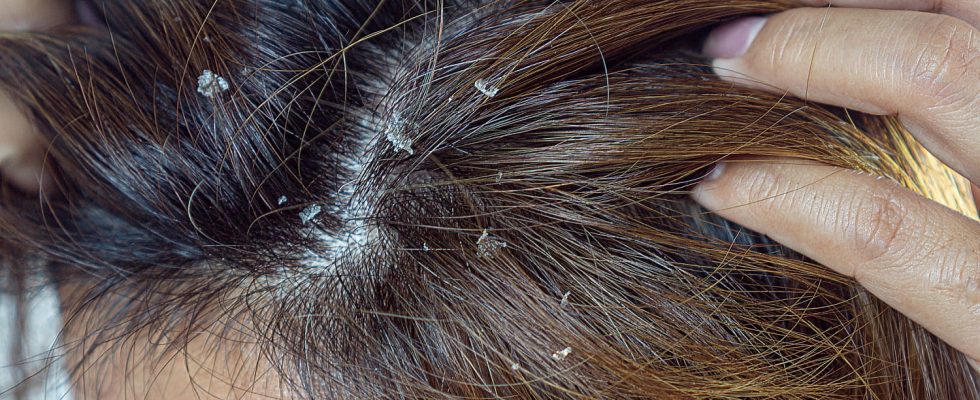Ringworm is a fungus that infects the hair (scalp) or beard hair. It is caused by fungi called “dermatophytes”. It is not dangerous but is very contagious.
Ringworm is a skin infection that affects scalp and beard. It is due to microscopic fungi that we call dermatophytes. How do you know if you have ringworm? What are symptoms ? Is she dangerous? Is it (very) contagious ? How to treat it? Can she disappear on her own?
What is the definition of ringworm?
Ringworm is a dermatophytia (infection) of the scalp (or beard). It’s about a mycosis due to contamination by fungi (parasitic micro-organisms) called dermatophytes. “Ringworm grows at the expense of hair and body hair. When fungi infect hair, they make it weak and brittle, or even cause it to fall out”, explains Dr. Marie Ferneiny, dermo-paediatrician at the Clinique Marcel Sembat (92). It exists :
→ Anthropophilic moths transmitted by humans
→ Zoophilic moths transmitted by animals such as dogs, cats, rabbits, horses
→ Soil moths (geophiles, present in the earth).
Photo of a ringworm on a scalp
What are the symptoms of ringworm?
Symptoms vary depending on the type of ringworm. According to the dermo-pediatrician, there are:
- The shape in scaly gray patches with scaly condition of the scalp that may mimic a dandruff condition
- The inflammatory pustular form with some acne-like pimples localized or disseminated
- A “black spot” varietycharacterized by small black dots (broken hair) within areas without hair.
- The kerionwhich corresponds to an inflammatory ringworm, which presents clinically as an inflammatory mass or abscess associated with a patch without hair in the eyes
When it evolves, ringworm can lead to bald areas. Sometimes there are feelings of itching or burning. There may also be swelling and secretion of moisture.
Who are the people at risk?
Ringworm mainly affects children. She is much less common after adolescence, but it is possible especially in the event of a drop in immunity. There is no immunity during an infection: an infected patient can again catch ringworm in the event of a new exposure.
A contagious disease for how long?
Ringworm is a highly contagious disease. The incubation period of the fungus is, on average, 2 to 14 days.
What causes ringworm?
Ringworms are manifestations of damage to the hair follicle and hair by certain fungi that penetrate the hair. They result from the transmission of this fungus from one infected person to another or from an animal to a human. You can carry spores of fungi that cause ringworm without developing the disease, but with a risk of transmitting it.
Fungal spores penetrate particularly well into moist, slightly softened or damaged skin. Transmission is possible:
- by direct skin-to-skin contact
- by skin contact with infected scalesespecially in a hot and humid environment (shower cubicle, changing room, sauna)
- by contact with contaminated objects, eg hat, cap or scarf, comb, brush, razor, clothing, stuffed animal, bath towel, bedding. But also by contact with coverings in a cinema, a bus, a train… as well as with horses, saddles, brushes, the dog’s basket…
Ringworm is a relatively simple disease to diagnose. Clinical observation allows the doctor to examine the characteristic skin lesions and to guide his diagnosis. In order to better visualize them and identify the fungus responsible, he can use an ultraviolet lamp called Wood’s light. In order to precisely identify the kind of fungus, he can take a sample. This sample will be analyzed under a microscope and cultured.
What treatment to get rid of ringworm?
The treatment of ringworm is only done after a sample is taken, and can be started without waiting for the results. It is systematically a local and oral treatment.
► Locally: We proceed for 1 or 2 months with the application of local antifungal drugs on the lesions, after having shaved the hair close to this area associated with antifungal shampoos twice a week
► By mouth : This involves taking antifungal medication for a minimum of 6 to 12 weeks.
What are the risks when you have ringworm?
The risks when you have ringworm are contagiousness, ringworm infection, hair loss with aesthetic risk. “Being a highly contagious infection, school exclusion is an obligation in that the child is still contagious”, confirms the doctor. The treatment allows a return to school. Returning to school then requires a certificate of non-contagion.
Can ringworm heal on its own?
“Treating ringworms can take Several weeks because the responsible fungi are very resistant”, insists the specialist. Local treatment with specific shampoos is not enough to cure ringworm but does reduce the spread of spores and, therefore, contagiousness. Shaving the hair has the same effect, but full clipping is not always essential. Ringworm treatment always requires tablet treatment for several months in combination with shampoos and creams.
Thanks to Dr Marie Ferneiny, dermo-pediatrician at the Marcel Sembat Clinic in Boulogne-Billancourt.

